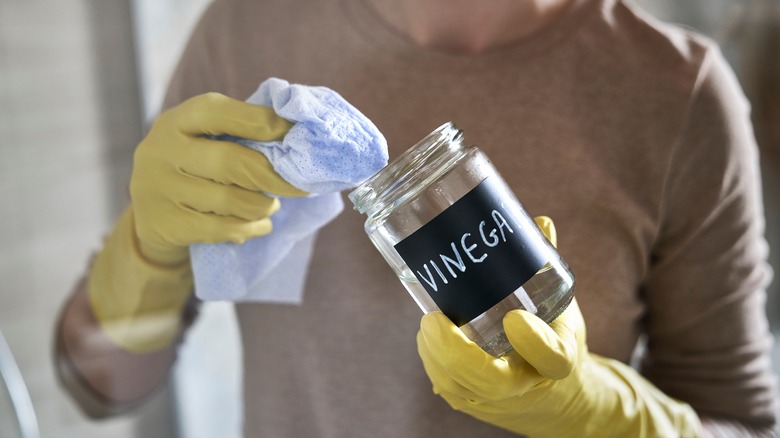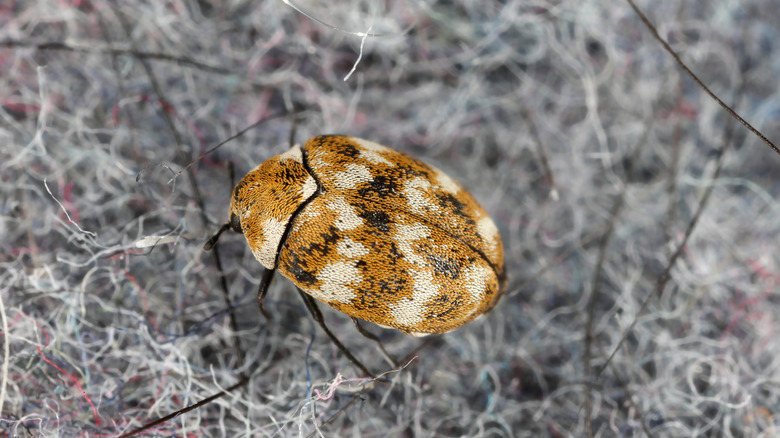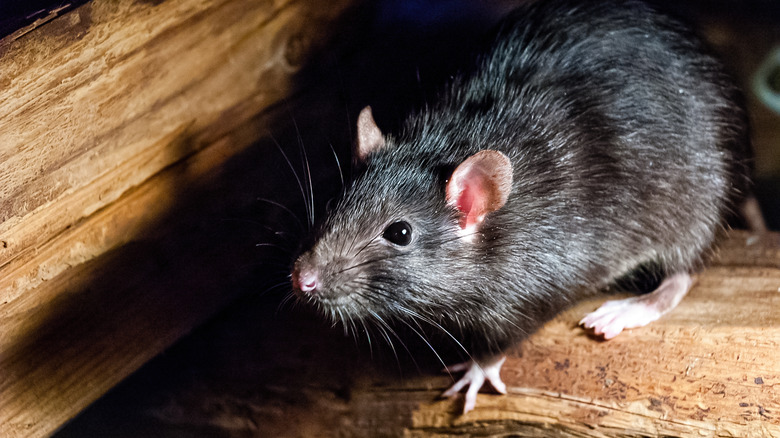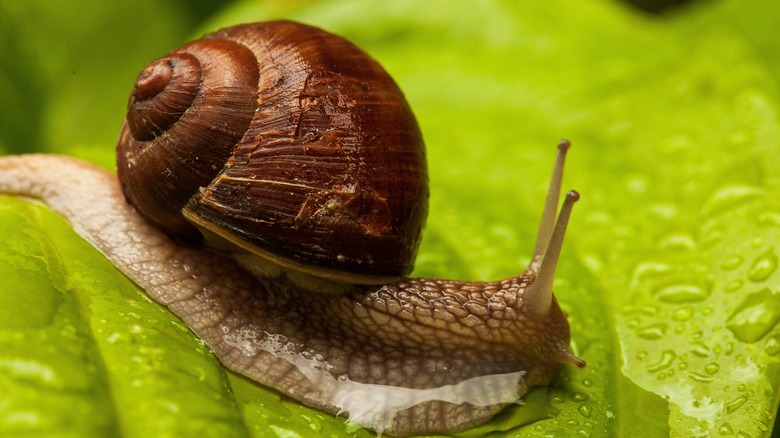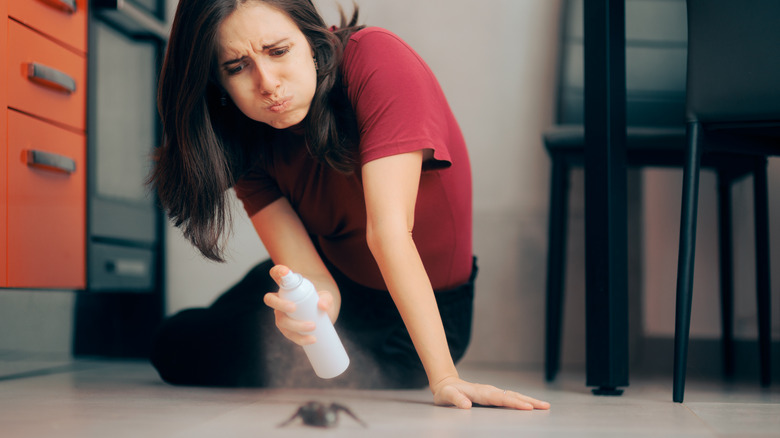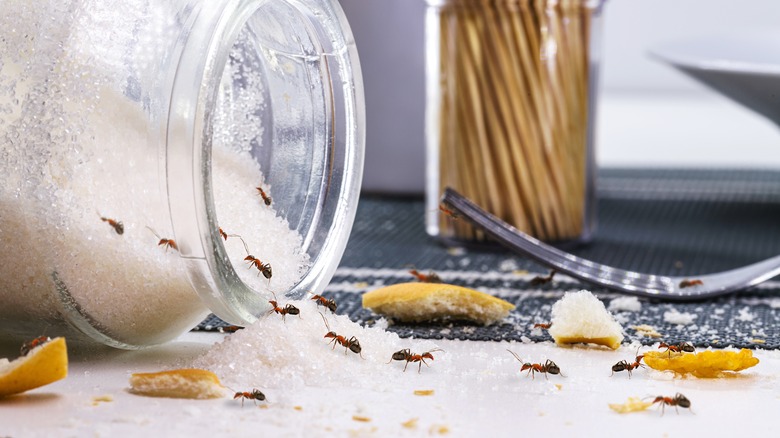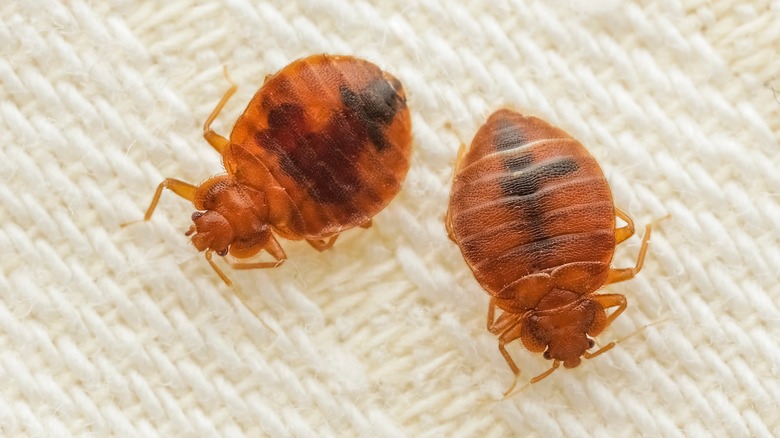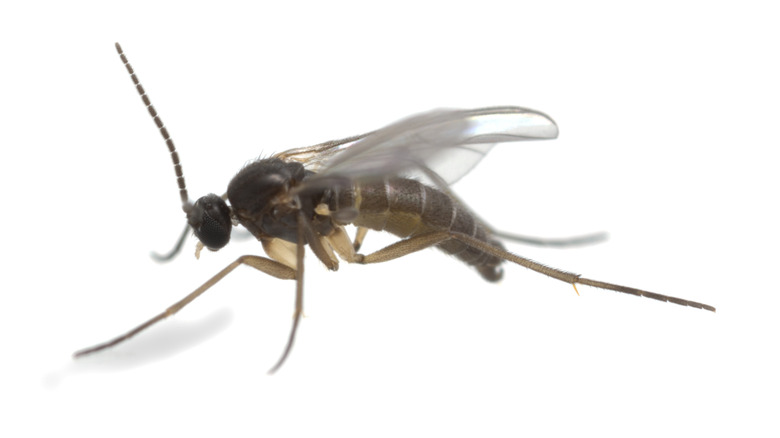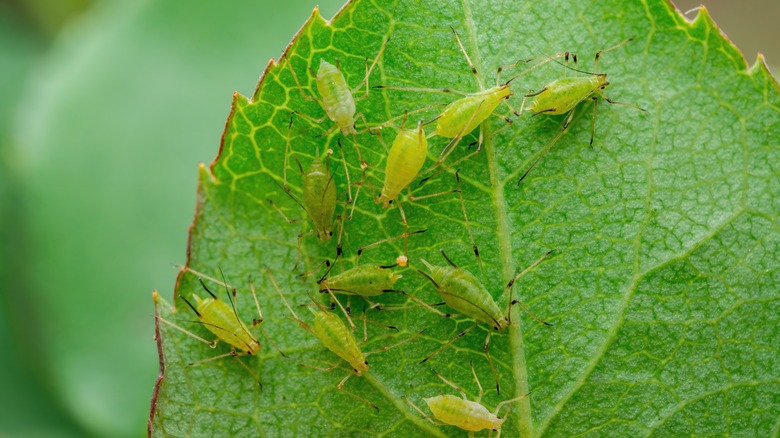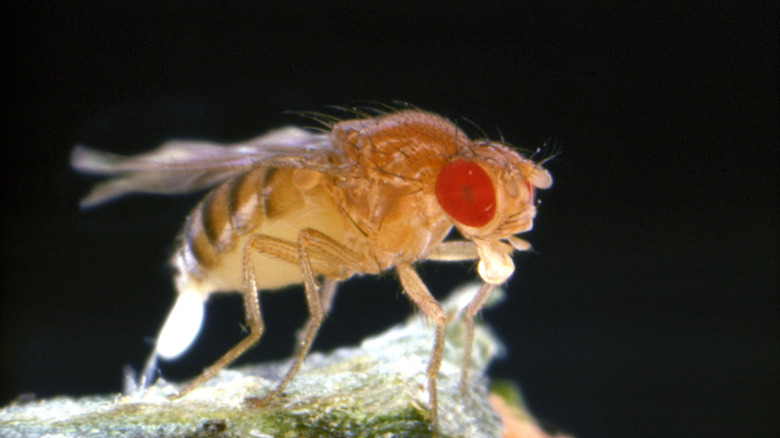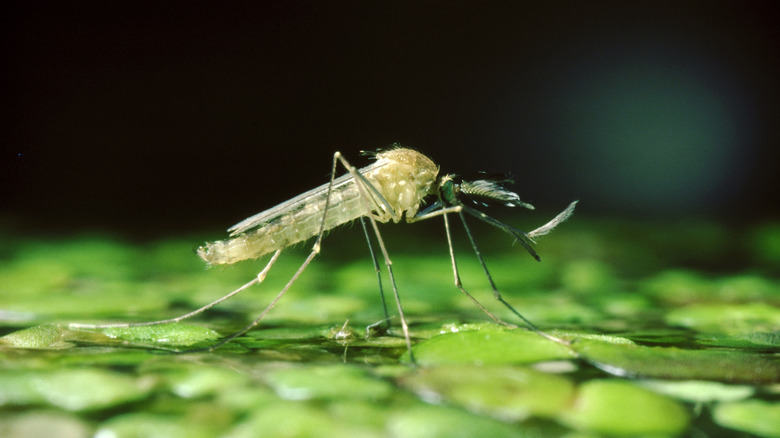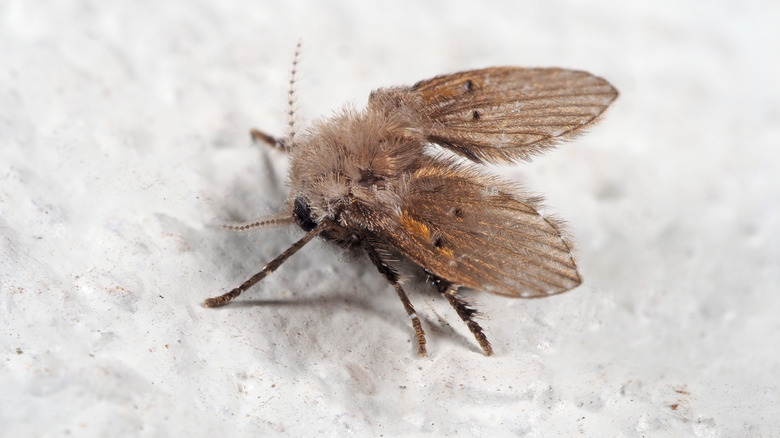11 Brilliant Ways You Should Be Using Vinegar To Get Rid Of Pests
In a perfect world, a home stays spotless, clean, and pest-free no matter how long you live in it. However, armies of pests of all sizes and manner of mobility can work to live in your home rent-free. No matter how they get into the property, they all have one goal in common: to take up residence in your beautiful home, causing damage and carrying pathogens.
But when you have vinegar on your side, you can level the playfield and foil their plans. Affordable, readily available, and quite harmless, vinegar has exceptional killing and repelling qualities against unwanted home invaders. The regular vinegar bottle in your pantry, be it white or apple cider, has between 4 to 8% acetic acid. Even at such low concentrations, it packs a punch and can send many creepy crawlies packing in a hurry. Whether used alone or in combination with other supplies around the house, the kitchen staple is the secret weapon you need in your war against pests.
Spray and kill carpet beetles
Carpet beetles are about an eighth inch long and have a patterned exterior. The larvae of the carpet beetle are the ones to watch out for. At this stage, they munch on all types of natural and organic fibers and can create considerable damage to rugs, upholstery, and any other fabrics they come across. Carpet beetles fly in through open windows and doors or hitch a ride on the fur of pets. You'll know you have an infestation when you see large bare areas in the rugs, holes in the clothes, and the shed skin of the larvae. That's where vinegar comes in. Both white and apple cider vinegar are effective against the carpet beetle in its larvae and adult stages.
To make the vinegar concoction, mix one part white or apple cider vinegar with one part water in a spray bottle and shake well. You'll need to spray the bugs, larvae, and eggs directly with the solution. So, locate them in dark corners, under the sofa cushions, or under rugs, then spray liberally. The acidic vinegar can dissolve the surface of the eggs and kill the adult bugs.
Repel rodents like rats and mice
Mice, rats, gophers, chipmunks, and squirrels are known to trespass on properties. They eat their way around the garden, kitchen, and pantry, leaving a trail of destruction in their wake. It's hard to miss the telltale signs of rodent infestation like droppings on the floor as well as gnaw marks on door jambs, window sills, and other entry points. These rodents spread diseases to humans both by direct contact or indirectly through bites by fleas and ticks they can carry. Here again, vinegar comes to the rescue. It won't have any serious health consequences for the rodents, but its powerful, pungent smell proves too much for their refined noses. Rodents avoid any areas saturated with acidic odors, which can be an effective way to keep them off the property.
The main challenge in using vinegar to repel rodents is how to keep the vinegar from drying and its odor from fading away too quickly. One option is to soak balls of cotton with undiluted vinegar and leave them in strategic areas near the access points to your home, as well as kitchen cabinets, the attic, and the basement. Check the cotton balls regularly and re-soak them with vinegar when they dry.
Stave off slug and snail infestations
Slugs and snails are usually the last thing you'd want to see when you check your garden or potted houseplants. The slimy critters prefer feeding on living plants, especially succulents, but they're not above feasting on dead and decaying plants as well. Seedlings don't stand a chance against an infestation. Tubers are not safe underground either as the pests feed on all parts of the plant. The slime trail and damage to the plants are dead giveaways that a mollusk rampage is in full swing. You could use pesticides to get rid of them, but vinegar is an excellent and eco-friendly alternative to control snails and slugs.
The acetic acid in vinegar can and will dissolve their soft bodies when it comes in direct contact with their skin. You won't be spraying it on the plants, so there's no need to cut it with water. Instead of going after a single invader at a time, gather a bunch of them in one place to make a dent in the population. To achieve that, place a wooden board on the ground in the evening. In the morning, flip the board to find snails and slugs hanging onto it. Spray them liberally with vinegar and clean the gooey mess afterward.
Get rid of spiders with little effort
Spiders inspire more fear and panic than they actually deserve. Although mostly harmless and can do a decent job capturing bugs, nobody likes to see the little pests scurrying about. Apart from their dead-bug-laden webs, which imply neglect and uncleanliness, house spiders shouldn't usually raise alarms or trigger any health concerns. Still, most people would rather have arachnids as far away from their homes as possible. And, you can get rid of spiders with the help of the humble vinegar bottle in your kitchen.
Undiluted white vinegar can inflict grave harm on the spiders. But the strong odors can be off-putting and if you have furry friends, acetic acid can instigate health issues. Mix vinegar with water in equal parts and spray the window sills, door jambs, corners, and other spots spiders could use to set up shop. Make sure to keep it well out of the reach of pets to avoid harming them. Reapply the vinegar treatment regularly to rejuvenate the spider-repelling odor.
Chase ants out of your house
While spiders can do more good than harm, ants cannot make the same claim. Granted, they do valuable work for the outdoor ecosystem, but their presence inside your home is another story. Carpenter ants, for example, can wreak havoc on any wooden structures, kitchen cabinets, and furniture. And, fire ants have a painful sting that can trigger a slew of health issues. These insects often show up in huge numbers, making it difficult to eradicate them easily. To get rid of ants, turn to vinegar and its potent acidic compound.
The liquid's strong aroma has a disruptive impact on the daily life of ants. It confuses them so they can't find the scent trail that takes them back to their nest. That makes your job of removing ants from your home a lot easier. Spray diluted vinegar with a dash of essential oils near the nest, doorways, and other areas where you spot ants. Some will die in the process, and the repelling scent will help prevent new ones from arriving.
Put an end to bed bugs
The mere mention of bed bugs can make people squirm uncomfortably, and the pests are the enemy of a good night's sleep. Their bites are painful and can trigger anything from a tiny itch to a severe allergic reaction, depending on the person bitten. An adult bed bug has a flat, oval, and reddish-brown body, about 1/4 inch in length. The young insect is often translucent, which works well as a camouflage. Distilled white vinegar and apple cider vinegar both can be used to repel bed bugs and kick them out of your slumber spot.
You will want the vinegar at its full potency without thinning it out with water. Fill a spray bottle with the liquid and go hunt for bed bugs. They usually take cover in cracks in the floor, narrow areas between pieces of furniture, and the seam of the mattress. Spray the areas well and open the windows to let the smell dissipate. Repeat once a day until you're rid of the pesky pests. Although vinegar can get rid of a few bed bugs, a large infestation would require a call to the exterminator.
Spray fungus gnats into oblivion
Some pests come in singles and make their presence as inconspicuous as possible. And then there are fungus gnats. The larvae of fungus gnats feed on fungi that cover the surface of the moist soil in potted houseplants. When they run out of fungi, the larvae feed on the roots of the living plants, which can stunt the plant's growth and, in the case of heavy infestations, kill them.
Vinegar can be an effective deterrent to fungus gnats in both the larvae and adult stages. Fill a spray bottle with a mixture of equal parts water and white vinegar. Spray the swarms of flying gnats to kill them on the spot. Vinegar spray can damage the houseplants and alter the soil's pH, so limit your application to the outside of the pot. It's also helpful to allow the soil in the pots to dry out to make it a less attractive home.
Give aphids the vinegar treatment
If you have indoor plants or some out in the garden, then you may already know what aphids can do. Pear-shaped and with soft bodies, the adult aphid is only about 1/8 of an inch. Yet, in large numbers, they can mutilate young and vulnerable plants, leave lasting scars, and impact their overall health. Instead of using pesticides that contaminate the environment or chemicals that might end up in your food, you can use vinegar spray to get rid of aphids.
Before you apply it, you'll need to dilute it with three parts water for every one part of vinegar. This minimizes the impact of the acidity on the plants and the soil. Test the spray on a part of the infected plant first to make sure that the vinegar mixture is safe. Then, come back in a day or two and examine the treated part. If the plant is still healthy with no withering or dead leaves, proceed to spray the rest of the plant for full protection.
Set a vinegar trap for fruit flies
So far, vinegar has proven great for repelling and killing bugs and keeping them out of the house. But not all insects find its acrid notes obnoxious. Fruit flies are a peculiar species of bugs that relish the aroma wafting out of the vinegar and congregate over the acidic liquid. With small tan-to-black bodies and bright red eyes, fruit flies feed on rotting fruits and vegetables and each adult female will lay a couple of thousand eggs right where they eat. So, it's time to turn their love for vinegar odors against them.
This vinegar trap is simple to set up and works as you might expect. Fill a small bowl with apple cider vinegar and add a teaspoon of dish soap to make it tougher for the fruit flies to get out of the solution. Cover the bowl with plastic wrap and poke holes in it to let the fruit flies in. The smell will attract them and the acidic vinegar will take care of the rest. When the bowl is filled with dead flies, throw away the contents and refill with a fresh mixture.
Deter mosquitoes with apple cider vinegar
Mosquitoes can single-handedly ruin a pleasant summer evening on the patio. They can also prevent you from opening the windows to let the cool breeze in and they have an uncanny ability to find their way in through the smallest openings. Life with mosquitoes is punctuated with intermittent itches, with the possibility of catching dengue, Zika, and yellow fever. Fortunately, you can repel adult mosquitoes and kill their larvae with the handy vinegar.
Fill a spray bottle with apple cider vinegar and water in equal portions and add a dash of your favorite essential oils. Keep the spray bottle at hand and spray your surroundings as well as the areas that mosquitoes are likely to target. If you have a body of water in the garden, chances are mosquitoes use it to lay their eggs. Pour apple cider vinegar into the water to kill mosquito eggs and larvae. The concentration of the vinegar in the water has to be at least 15% to be effective. If the body of water is too big, such as a swimming pool, cover it to prevent mosquitoes from using it as a breeding ground.
Terminate drain flies with extreme prejudice
Drain flies start their fleeting life in the drain. From there they move to the walls and sink of the bathroom and the kitchen where it's humid and cozy. In doing so, they spread pathogens on surfaces you can come in contact with. Furthermore, dead drain flies could trigger allergic reactions in susceptible people. The tiny bugs with their fuzzy wings look like moths and go by many names, including moth flies, sewer gnats, or sink flies. Drain flies don't like to stay airborne for long and quickly find a surface to land on. Much like fruit flies, which they're sometimes mistaken for, drain flies are attracted to the smell of apple cider vinegar.
A nice little vinegar trap of apple cider vinegar with a dollop of dish soap in a bowl is all you need to catch the elusive rascals. Keep the bowl next to the sink or shower drain overnight. Refill the trap in the morning and repeat the process until you no longer see drain flies flitting about in your bathroom and kitchen area.
